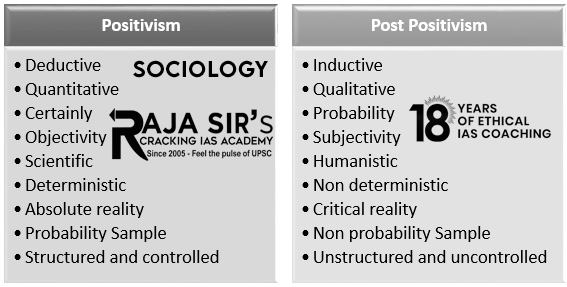- Home
- Prelims
- Mains
- Current Affairs
- Study Materials
- Test Series
Examine the basic postulates of positivism and post-positivism. (UPSC CSE Mains 2017 - Sociology, Paper 1)
Positivism
Positivism is an approach that views the world as ‘out there’ waiting be observed and analysed by the researcher. Theories that are built on positivism see the world ‘as it is’ and base their assumptions upon analysing physical elements such as states and international organisations, which they can account for and ascribe values to. Positivism is therefore based on the study of facts and the gathering of physical evidence. It is related to the scientific view of the natural world as being one that operates via laws (such as gravity) that can be revealed by careful study and observation. Positivists assert that equivalent laws can be revealed about the social world.
Tenets of Positivism
- Fact- People believe more in factual content than in bluffs and theories that have no proof.
- Laws which are Scientific – Laws that are used for prediction and science-based
- Atomism – A concept or a study can be simplified by breaking it down into smaller fragments or parts.
- Naturalism- The principles of Nature and sciences must be taken into consideration.
- Phenomenalism- Valid information is only provided by observed phenomena.
- Nominalism- Scientific terms have unique and separate meanings. The presence of a term does not imply that the thing it describes exists.
Influenced by the prevailing atmosphere of rationalism and science, early sociologists like Saint Simon, Comte, Spencer, John Stuart Mill and Durkheim attempted to define the subject matter and the method of sociology in scientific and objective terms.
Post-Positivism
Postpositivism rejects the positivist approach that a researcher can be an independent observer of the social world. Postpositivists argue that the ideas, and even the particular identity, of a researcher influences what they observe and therefore impacts upon what they conclude. Postpositivism pursues objective answers by attempting to recognise, and work with, such biases with the theories and knowledge that theorists develop.
Post-positivist research accepts concepts to be relevant only if they support action. It says that a lot of our interpretations may be based on assumptions and conjectures.
- Researchers practising this approach believe that there are laws and theories that govern the world and they can be identified and tested using scientific methods.
- Post positivist research starts with a theory, collects data, and this either supports or rejects the theory, which results in the theory being revised before additional tests are made.
- In the post-positivist approach to research, the following types of researches got emphasized :
- Phenomenological research : (Alfred Schutz)
- An approach to qualitative research that focuses on the commonality of a lived experience within a particular group.
- The researcher attempts to understand how one or more individuals experience a phenomenon.
- For example, interviewing the wives of 10 prisoners of war and asking them to describe their experiences.
- Ethnographic research :( Harold Garfinkel)
- The process of studying and describing a culture.
- It provides an insider’s picture of a community under study.
- The researcher can go and live in a specific community where the research is going to conduct and study the culture and their educational practices.
- Action research: (Kurt Lewin)
- A wide variety of investigative, evaluative, and analytical research methods are designed to identify problems – be it organizational or academic – and help researchers to develop practical solutions to address them quickly and efficiently.
- May also be applied to educational techniques that are not necessarily problematic but researchers want to identify a change or improve their knowledge.
Action research is also called a “cycle of actions” because it follows a predefined process that is repeated over time, i.e., PLAN → ACT → OBSERVE → REFLECT.










 Latest News
Latest News
 General Studies
General Studies